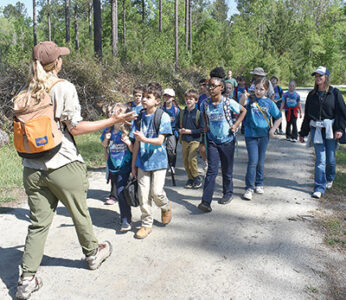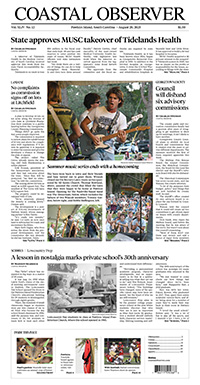Education
A classroom as big as all outdoors

The Black River Cypress Preserve in Andrews has quickly become a destination for outdoor learning.
Lower elementary students from Coastal Montessori Charter School visited the preserve last week and spent a few hours discovering insects, plants and animal tracks during a hike.
“It fosters an empathy and responsibility for nature,” said Shaye Heiskell, who is a lead teacher at the school. “It helps them build a better connection to the world around them”
Heiskell prefers “unstructured” time for kids rather than screen time.
“It’s a time to sit and discover and notice things,” Heiskell said. “It really does help support their imagination and creativity.”
The charter school has spent the past few years developing an outdoor classroom on the property next to the campus.
Heiskell will sometimes take students out there at the beginning of the school day.
“I notice that when we come back in they are able to settle into their work,” she said.
All Coastal Montessori students have had the opportunity to visit the preserve, but the experience is different depending on the students’ ages.
Some of the older students bike along the trails instead of hiking. The sixth-, seventh-, and eighth-graders have gone kayaking on the Black River, which runs through the property.
“It’s no surprise to anybody that being outdoors is good for kids,” Heiskell said.
Andrews High School students have been frequent visitors to the preserve as part of the Black River Education Initiative, a program that uses outdoor, non-traditional curriculum to introduce students to careers in parks, agriculture, sustainability and eco-tourism.
The students are enrolled in an agricultural science class this semester taught by Quandre Green.
Green knows how important it is for his students to get out of the classroom.
“Reading a book is one learning facet. But actually being hands on, that’s a whole different mind process,” Green said. “You’re able to take those isolated bricks from the reading and actually glue them together and build a solid foundation.”
Green believes his students learn things faster in the field.
Last week at the preserve, Sarah Wilson showed the Andrews High students how she tests the water at different sites on the property for pH, turbidity, dissolved oxygen, nitrates and nitrites, phosphorus and ammonia.
Wilson is a retired educator who used to work at the charter school. She is now the outdoor educational and recreation manager at the preserve.
Andrews High has been planning for the Black River Education Initiative for months.
So far the agricultural science class is meeting Green’s expectation.
“As more expectations come, I can see that it is limitless,” he said. “With this I realize how fluid the program and the learning is. I just don’t want to constrain it or put it in a cement block because that’s not what this learning is.”
Once a week, Green and his students are in a lab where they work on projects like cultivating flies. They also take “ecological” walks around the school’s campus.
Green said there’s been a lot of interest from other students wanting to take the class in the next school year.
“A lot of kids have been coming up me and saying ‘Green, I’m taking your class next year, I’m just so ready for it,’” he said. “The word of mouth is definitely spreading.”
Andrews High principal Toshawnka Mahone wants to expand the initiative beyond this semester’s first class and add more advanced classes.
Green said the hope is that eventually the initiative could become part of the district’s Career and Technology Education program.




